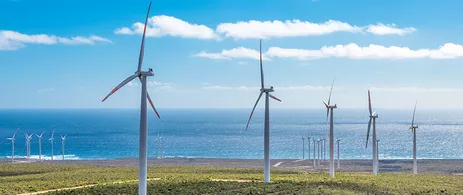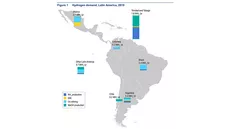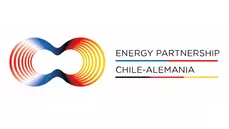
Hydrogen is a hot topic as an alternative source of propulsion. When it is produced from renewable energy sources, we speak of green hydrogen. Latin America has huge potential here, and Chile in particular is already showing what the future could look like – also in terms of cooperation with German partners.
Green hydrogen, for the production of which, in contrast to its grey version, no fossil energy sources such as natural gas are used in refineries, is becoming increasingly important in industry and transport. Production costs are still a hurdle so far. However, companies and research institutions around the world are working to make it as efficient as possible to produce and use, and governments in these countries are explicitly supporting the development of green fuel.
Potential in Latin America

A new report from the International Energy Agency (IEA) suggests that green hydrogen could be one of the main drivers of the next phase of the energy transition in Latin America.
According to the report, eleven countries in the region have already published or are working on national hydrogen strategies and roadmaps: Argentina, Bolivia, Brazil, Chile, Colombia, Costa Rica, El Salvador, Panama, Paraguay, Trinidad and Tobago, and Uruguay.
There are currently 25 green hydrogen projects in the early stages of development. A big step forward compared to 2019 when, before the Covid-19 pandemic, low-carbon hydrogen production was limited to three pilot projects in Argentina, Chile, and Costa Rica.
Energy costs are another key point for the big shift towards more green energy in Chile: according to the analysis, the diverse and competitive renewable energy sources in much of the country in particular make the region attractive for the projects. "Chile has set a goal to produce and export the world's most competitive renewable hydrogen by 2030, and many Latin American countries have the same prerequisites that can make the region a global leader in low-carbon hydrogen production," the report says.
Chile leads the way
Chile, a world leader in the use of solar energy, was the first country in the region to launch a National Strategy for Green Hydrogen in November 2020. It is also the only Latin American country with two projects in development:
- HyEx, a project of French energy company Engie and Chilean mining company Enaex, and
- Highly Innovative Fuels (HIF), a project by AME, Enap, Enel Green Power, and German partners Porsche and Siemens Energy

HyEx, based in Antofagasta in northern Chile, will use solar energy to power 1.6 GW of electrolysers. Electrolysers are devices that can produce (electrolytic) hydrogen through a chemical process. In this case, the green hydrogen produced will be used directly in mining.
In mid-2021, the semi-governmental foundation Fundación Chile presented its ambitious investment plan: A 300-million-dollar fund is to be published at the beginning of next year.
The specific aim here is to promote the development of green hydrogen as a tool for the transition to clean energy. Initially, the foundation would like to support non-scientific projects that already yield profits after two to three years.
German-Chilean Energy Alliance
The German-Chilean Energy Partnership started its work in April 2019. Partners are the German Federal Ministry for Economic Affairs and Energy (BMWi) and the Chilean Ministry of Energy (ME). The project office is based in Santiago de Chile. GIZ acts as the executing agency of the partnership.
A hydrogen task force was established in June 2021. The aim is to further intensify cooperation between the two countries to create suitable framework conditions for the development of a hydrogen economy and to identify concrete joint lighthouse projects.
Federal Minister for Economic Affairs and Energy Peter Altmaier referred to the H2Global program - a German government initiative aimed at importing green hydrogen and supporting electrolyser projects abroad. Altmaier said that "cooperation with Chile is important because the major players in the German energy sector are looking for new trade routes to import green hydrogen as a clean alternative to fossil fuels."
Collaborations TUM - Latin America
If you are interested in a cooperation with TUM or with Chilean / Latin American partners on the topic of green hydrogen, please contact the liaison office for Latin America. TUM São Paulo liaison officer Sören Metz is looking forward to hearing from you.